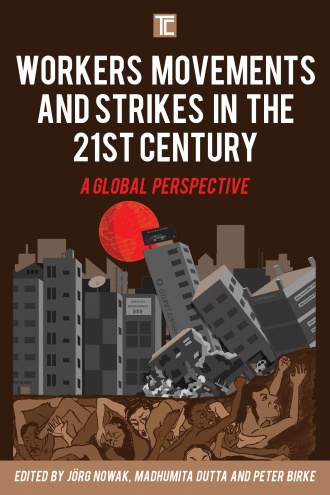This is the last article you can read this month
You can read more article this month
You can read more articles this month
Sorry your limit is up for this month
Reset on:
Please help support the Morning Star by subscribing here
Workers’ Movements and Strikes in the 21st Century: A Global Perspective
Edited by Jorg Nowak, Madhumita Dutta and Peter Birke
(Rowman and Littlefield, £29.95)
IF YOU’VE come across Schrodinger's Cat — an exasperating thought experiment in quantum physics in which a cat is simultaneously alive and dead — you’ll be equally vexed by a paradox concocted by the mainstream media. This is Schrodinger's Strike, action which “holds the county to ransom” but, strangely, receives no support from workers and has no impact on employers or government.

This book challenges that dismissive and negative view of resistance to neoliberalism, with the editors pointing out that the 21st century has seen a global resurgence of working class struggle in general, and strikes in particular, and they suggest that rising food prices and the global financial crisis of 10 years ago have led to new configurations of protest.
Contemporary strikes are often transnational, with different forms of action in different economies. More of them involve public-sector workers, more women take part, there is increased unrest in service industries and more strikes are driven by direct opposition to neoliberal policies.
In essence, the book is a series of case studies outlining struggles in Asia, the Americas, Africa and Europe, with contributors linking actions in the workplace to other aspects of life, such as gentrification, corporate land grabs, the reshaping of cities and diminishing public ownership.
Bindhulakshmi Pattadath’s study of the everyday resistance and survival tactics of undocumented Indian female domestic workers in the United Arab Emirates is an inspiring but exacting read. It considers the Habermasian concept of public space and suggests that the use of informal spaces establishes visible group identity and, in turn, creates new forms of community that support privacy, mobility and access to services.
In his piece on Britain, Alexander Gallas acknowledges a decrease in industrial action in the 21st century but identifies a fundamental shift in the causes and nature of strikes. Action by public sector unions tends to be political at the outset because it is sparked by opposition to funding cuts or privatisation. Gallas laments the historical tendency of unions to surrender strategic objectives to Labour politicians and suggests that the struggle against neoliberalism is critically dependent on unions retaining their political role.
Femi Aborisade and Drew Povey make a similar point in their essay on mass strikes in Nigeria, where a social-democrat government has failed to deliver on promises in relation to education, health and a social wage. The authors see trade unions as the potential nucleus of a socialist movement that can challenge the power of churches, mosques and corrupt politicians.
The 16 studies include those focusing on the struggle for recognition by subcontracted workers in the Chilean copper industry, the formation of a new union by informally employed workers in India, the grassroots alliances of the Indonesian labour movement and the vision of global social justice that inspired workers in Mozambique.
Encouraging, honest and meticulously researched, this book is a good starting point for anyone wanting to understand the motivations, strategies, objectives and potential of working class struggle around the planet.









